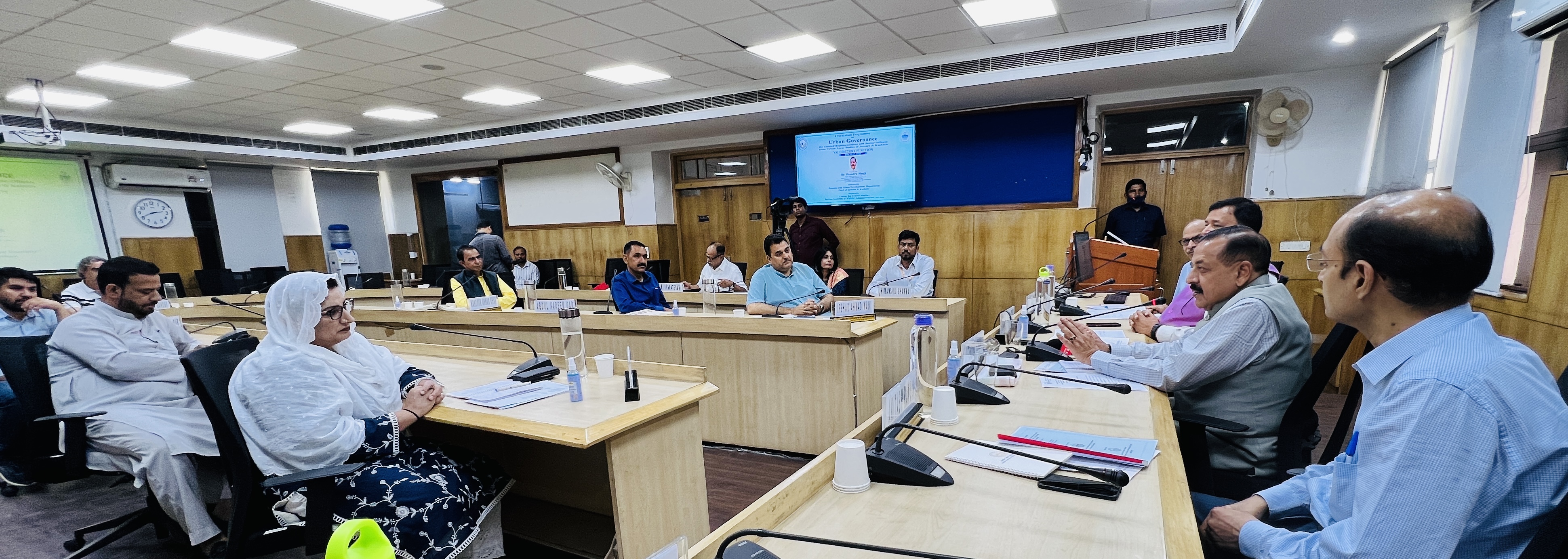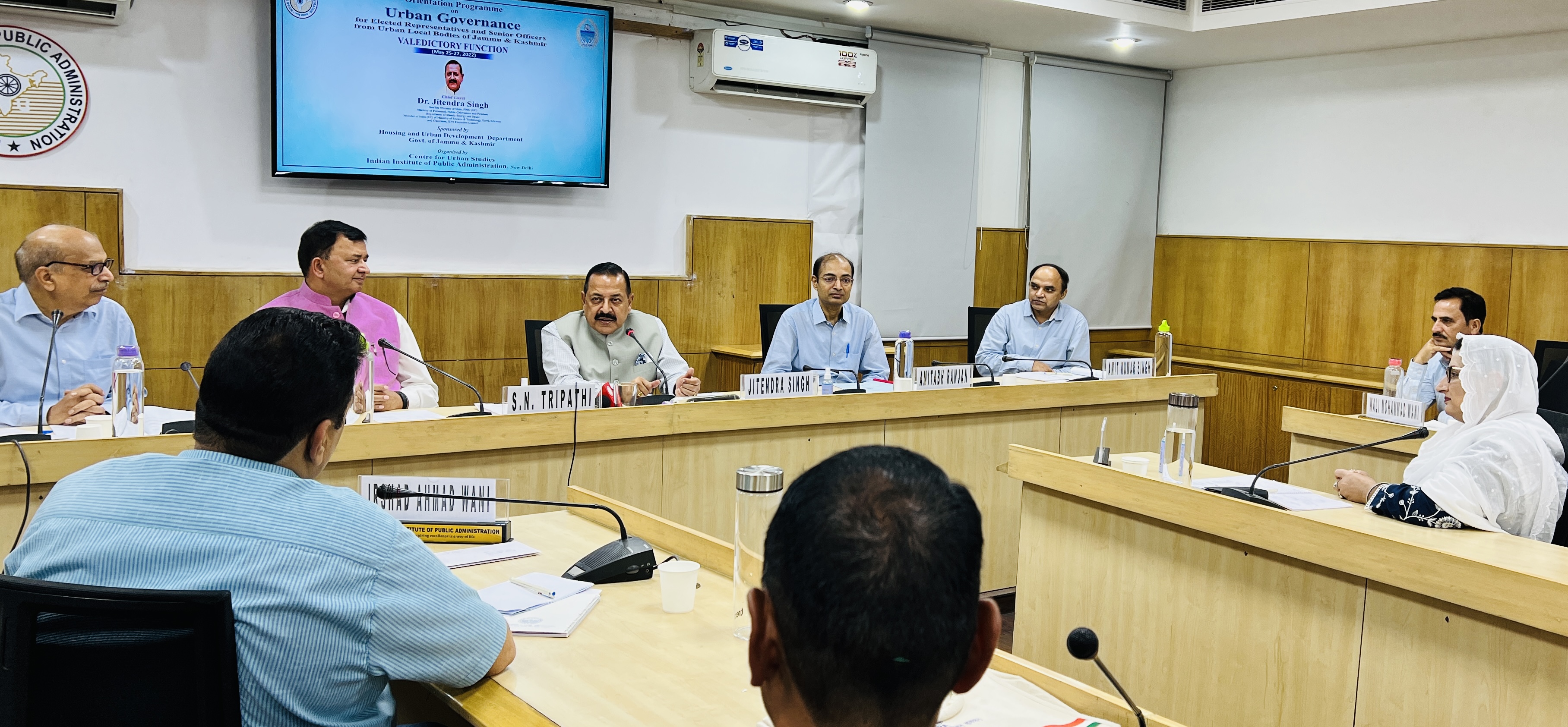Union Minister of State (Independent Charge) Ministry of Science and Technology; Minister of State (Independent Charge) Ministry of Earth Science; MoS of Prime Minister’s Office and Ministry of Personnel,
Union Minister of State (Independent Charge) Ministry of Science and Technology; Minister of State (Independent Charge) Ministry of Earth Science; MoS of Prime Minister’s Office and Ministry of Personnel, Public Grievances & Pensions, Atomic Energy and Space, Dr Jitendra Singh today addressed the Orientation Programme on Urban Governance for the Mayors/Municipal Chairpersons and Municipal Executives Officers of Urban Local Bodies from the Kashmir division of Jammu & Kashmir. A similar programme for the Mayors/Municipal Chairpersons and Municipal Commissioners/Chief Executives Officers of the Jammu division was conducted some time back.

Interacting with the participants, the Minister said, in the last three years Urban Local Bodies (ULBs) of J&K have made significant progress in the implementation of central missions on urban development which specially include PMSVanidhi, Pradhan Mantri Avas Yojana, Swachh Bharat Mission 2.0 and National Urban Livelihood Mission.
Dr Jitendra Singh said, elected leaders and officers from ULBs will work as a team to address local concerns for the betterment of state as they are backbone of our democratic system. He also suggested them to work for more effective communication with the community to adapt modern technology on solid waste management, solar energy, sewage treatment and conservation of natural environment in their towns. The Minister added that Jammu and Kashmir is undergoing a process of rapid economic growth wherein ULBs play an important role to enable growth of manufacturing and services with suitable development of municipal infrastructure.
Irashad Ahmad Wani, President MC Hajin, Abdul Karim Dar, President MC Kunzar, Masroor Ahmad Banday, President MC Handwara,. Musarat Nissar, President MC Sopora, Mehraj-ud Din Dar, President MC Budgam, Muneeb Ahmad, President MC Kulgam, Shri Manzoor Ahmad Khan, President MC Tral, Shri Wali Mohammad Wani, I/C Chief Ex. Officer MC Bandipora, Imtiyazu ul Haq , Executive Officer MC Baramulla, Aijaz Ahmad Khan, Executive Officer MC Wattergam, Suhail Ahmad Malik, Executive Officer MC Bijbehara, Mohammad Irfan Wani, Executive Officer MC Devsar, Mir Tafveer Mehmood, Executive Officer MC Pahalgam, Tareeq Hassan Lone, I/C Executive Officer MC Mattan, Nazeer Ahmad Dar, I/C Executive Officer MC Budqam, Farooq Ahmad Rather, I/C Executive Officer MC Handwara took part in today’s deliberations.

Dr Jitendra Singh pointed out that this orientation programme has components and issues under the Government of India Urban Missions and initiatives taken by other cities in the country. These include innovations and adaptation technology under respective mission like SBM 2.0 and Smart Cities Mission and AMRUT (Atal Mission for Rejuvenation and Urban transformation) to apply in J&K. The Minister emphasised that it is not only urban department, but initiatives on education, MSME ((Micro Small and Medium Enterprises), Power, PWD etc. have some components which need your attention. He asked the elected representatives to concentrate on our missions and the schemes of state government to find out the areas which are not yet initiated.
Dr Jitendra Singh underlined that the UT had municipal elections after a long gap in 2019 and right now we are in a process of strengthening ULBs in our state with functions and powers. He said, the implementation of 74th Constitution Amendment Act of 1993 will pave way for specific reforms and at this stage there are issues of coordination and devolution of powers and services to ULBs which will be resolved amicably soon, but your presence itself has generated a local voice and bottom-up leadership which has created a pressure group for local democracy.
The Minister said, it is expected that by 2047 when we achieve 100 years of our independence, states in India will have a common agenda to achieve jobs and income for vast population spared from their rural areas. This means growth of urban areas as engines of economic growth as we have seen in the western part of our country from Gujarat to Tamil Nadu. In this regard our state had 27% urban population in 2011 and this poses a challenge to move towards half way mark of urbanisation which means more attention on and investment in the economic activities in the state. Small and medium towns of J&K will play important role to create economic activities particularly in the areas of processing agro-produce, weaving industry, and development of IT services. These towns will also operate as service centre for rural hinterland.
It is visible in our country that the states with the above average level of urbanisation have much higher per capita income than states with low level of urbanisation like Bihar, Chhattisgarh, Jharkhand, Madhya Pradesh, Odisha etc. The states from Gujarat up to Tamil Nadu have either achieved 50% mark (Tamil Nadu) or are closer to the urban majority.
<><><><><>
SNC/RR
(Release ID: 1828788)
Visitor Counter : 422
Read this release in:
Urdu
